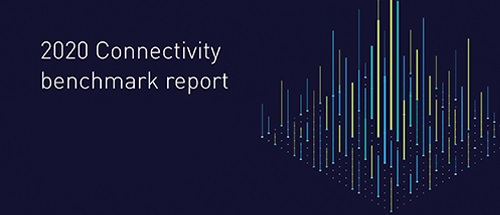Check Point® Software Technologies Ltd.(link is external) has emerged as a leading player in Attack Surface Management (ASM) with its acquisition of Cyberint, as highlighted in the recent GigaOm Radar report.
Organizations are increasingly leveraging APIs as building blocks to streamline integration while supporting reuse and self-service across the enterprise, according to the 2020 Connectivity Benchmark Report from MuleSoft and Vanson Bourne.
In fact 80% of businesses currently use public or private APIs. However, very few have developed a strategic approach to enable API usage across the business.

Report findings include:
■ Company-wide API strategies are necessary to drive true value and reuse: Only 12% of organizations are mandated by leadership to abide by a company-wide API integration strategy for all projects. More than half (54%) implement APIs on a project-by-project basis or use a strategy that's siloed within certain parts of the business.
■ Businesses don't have an easy way to share APIs: Less than half (42%) of internal software assets and components (e.g., code, APIs, best practice templates) are available for developers to reuse. Most organizations (80%) also don't have a completely effective way to share APIs or integrations.
■ New business users are emerging, amplifying the need for reuse: Outside of IT, the top three business roles with integration needs include business analysts (40%), data scientists (38%) and customer support (38%).
■ Citizen integrators lack critical internal resources: 70% of ITDMs say they have a good strategy in place to enable non-technical business users to easily integrate apps and data sources with APIs. Despite this high level of confidence, 67% don't have a team that's dedicated to driving the sharing and reuse of APIs.
API Reuse Linked to Speed of Innovation, Operational Efficiency and Revenue
By establishing API strategies that promote self-service and reuse, businesses put themselves in a much better position to innovate at speed, increase productivity and open up new revenue streams.
More than half (52%) of organizations say that IT has generated the most business value by building reusable integrations that save time and money on future projects. Despite this success, only 42% of ITDMs are leveraging APIs to increase the efficiency of their application development processes.
■ Most organizations are making integration harder on themselves by not designing APIs for reuse: Among organizations that leverage APIs, 52% use them as part of the development process for new projects and 52% use them to build integrations. However, less than half (46%) say their APIs are reusable, highlighting outsize opportunity for IT to be more effective in the delivery process.
■ Organizations aren't activating API ecosystems: Of those leveraging APIs, only 26% of organizations are driving innovation with partner and external developer ecosystems by exposing them to third parties.
■ When designed with intent, APIs drive business outcomes: Organizations using APIs benefit from operational improvements such as increased productivity (54%), increased innovation (47%) and greater cross-team agility for self-serve IT (46%).
■ APIs are the new revenue stream: On average, nearly a third (31%) of businesses' revenue is being generated by APIs or by API-related implementations.
Methodology: For the fifth annual Connectivity Benchmark Report, MuleSoft, in partnership with Vanson Bourne, surveyed 800 IT leaders from global enterprises. The goal was to uncover how much value businesses actually gain from digital transformation, and to understand IT leaders' most successful strategies for achieving digital transformation goals. The online survey was conducted between October and November 2019 across the United States, the United Kingdom, France, Germany, Netherlands, Australia, Singapore, Hong Kong and Japan. Only suitable candidates participated in the survey and were verified by using a rigorous, multi-level screening process. All respondents work at an enterprise organization in the public or private sector with at least 1,000 employees and hold a managerial position or above in an IT department.
Industry News
GitHub announced the general availability of security campaigns with Copilot Autofix to help security and developer teams rapidly reduce security debt across their entire codebase.
DX and Spotify announced a partnership to help engineering organizations achieve higher returns on investment and business impact from their Spotify Portal for Backstage implementation.
Appfire announced its launch of the Appfire Cloud Advantage Alliance.
Salt Security announced API integrations with the CrowdStrike Falcon® platform to enhance and accelerate API discovery, posture governance and threat protection.
Lucid Software has acquired airfocus, an AI-powered product management and roadmapping platform designed to help teams prioritize and build the right products faster.
StackGen has partnered with Google Cloud Platform (GCP) to bring its platform to the Google Cloud Marketplace.
Tricentis announced its spring release of new cloud capabilities for the company’s AI-powered, model-based test automation solution, Tricentis Tosca.
Lucid Software has acquired airfocus, an AI-powered product management and roadmapping platform designed to help teams prioritize and build the right products faster.
AutonomyAI announced its launch from stealth with $4 million in pre-seed funding.
Kong announced the launch of the latest version of Kong AI Gateway, which introduces new features to provide the AI security and governance guardrails needed to make GenAI and Agentic AI production-ready.
Traefik Labs announced significant enhancements to its AI Gateway platform along with new developer tools designed to streamline enterprise AI adoption and API development.
Zencoder released its next-generation AI coding and unit testing agents, designed to accelerate software development for professional engineers.
Windsurf (formerly Codeium) and Netlify announced a new technology partnership that brings seamless, one-click deployment directly into the developer's integrated development environment (IDE.)













